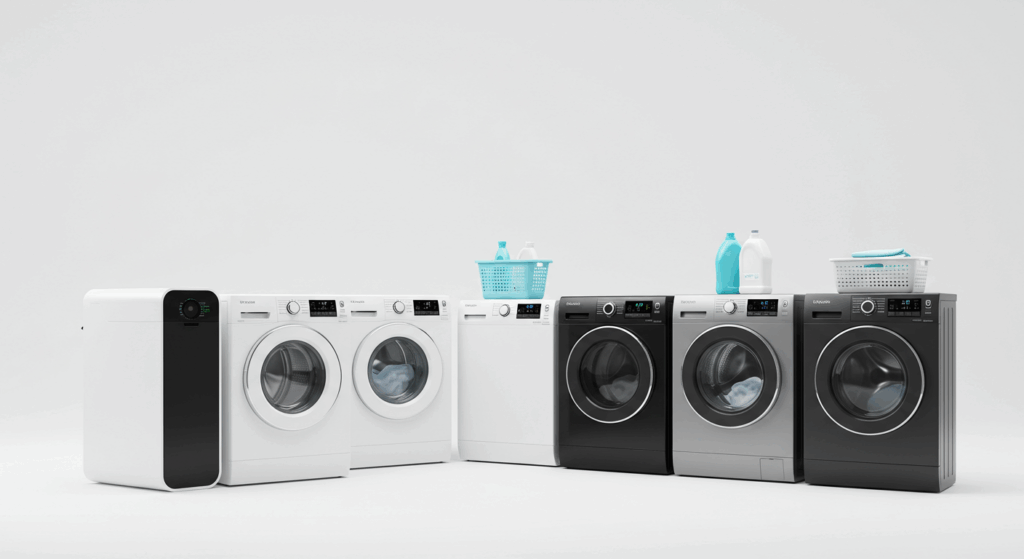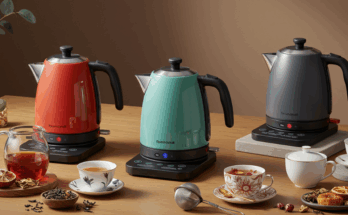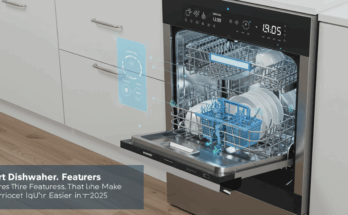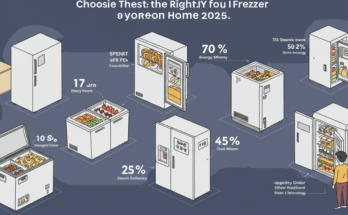As energy costs continue to rise and environmental concerns take center stage, choosing an energy-efficient washing machine is a smart move for both your wallet and the planet. In 2025, washing machine technology has evolved to offer impressive efficiency without compromising cleaning performance. With households running hundreds of laundry loads annually—approximately 300 for the average American family and up to 470 for a family of four—selecting a model that minimizes energy and water usage is more important than ever. This blog post explores the best energy-efficient washing machines for 2025, highlighting top models, key features to consider, and tips for maximizing efficiency, based on expert reviews, user feedback, and industry standards.
Why Energy Efficiency Matters in Washing Machines
Energy-efficient washing machines are designed to reduce electricity and water consumption, lowering utility bills and environmental impact. According to the EPA’s ENERGY STAR program, certified washers use about 20% less energy and 30% less water than standard models, saving approximately $530 over the appliance’s lifetime. With 60% of U.S. electricity generated from fossil fuels, choosing an efficient model also reduces greenhouse gas emissions. Additionally, modern washers incorporate advanced technologies like inverter motors, smart sensors, and eco-friendly wash cycles that enhance performance while conserving resources.
When selecting an energy-efficient washing machine, consider factors such as:
- Energy Star Certification: Ensures the model meets strict energy and water efficiency standards.
- Integrated Modified Energy Factor (IMEF): A higher IMEF indicates better energy efficiency, accounting for energy used during washing, standby, and water heating.
- Integrated Water Factor (IWF): A lower IWF means less water used per cubic foot of capacity.
- Capacity and Load Size: Larger drums can reduce the number of cycles needed, but smaller capacities may use less energy per load.
- Cycle Options: Eco modes, cold-water cycles, and quick-wash settings enhance efficiency.
- Smart Features: Apps and sensors optimize water and energy use based on load size and fabric type.
Below, we highlight five of the best energy-efficient washing machines for 2025, drawing from expert tests, user reviews, and energy performance data.
Top Energy-Efficient Washing Machines for 2025
1. Electrolux ELFW7537AW Front Load Steam Washer
- Capacity: 4.5 cubic feet
- Energy Consumption: ~100 kWh/year
- Water Usage: ~14 gallons/load
- Energy Rating: ENERGY STAR Certified
- Price: ~$999
- Key Features:
- High IMEF of 3.2, one of the most efficient in its class.
- Adaptive dispenser compatible with pods and liquid detergent, reducing waste.
- Multiple presets, including eco cold, steam, and 15-minute fast wash.
- Quiet operation, ideal for small spaces or apartments.
The Electrolux ELFW7537AW stands out for its exceptional energy efficiency and cleaning performance. Tested by experts at Better Homes & Gardens, this front-load washer impressed with its ability to handle various load types, from activewear to towels, while keeping energy and water usage low. Its steam feature tackles tough stains without requiring high temperatures, saving energy. Users appreciate the intuitive controls and quiet operation, though some note a learning curve with the extensive preset options. This model is perfect for families seeking a balance of efficiency, capacity, and advanced features.
2. LG WM4000HWA Front-Load Washer
- Capacity: 4.5 cubic feet
- Energy Consumption: ~105 kWh/year
- Water Usage: ~14 gallons/load
- Energy Rating: ENERGY STAR Certified
- Price: ~$848
- Key Features:
- TurboWash 360 technology for shorter, efficient cycles (as quick as 37 minutes for an 8-pound load).
- LG ThinQ app for remote monitoring and energy usage tracking.
- Stainless steel drum for durability and gentleness on fabrics.
- Stackable design for space-saving.
LG’s WM4000HWA is a favorite among experts at Wirecutter and CNET for its reliability, efficiency, and versatility. Its TurboWash 360 setting uses five spray jets to clean thoroughly while minimizing water and energy use. The ThinQ app allows users to monitor energy consumption and receive maintenance alerts, ensuring long-term efficiency. With 12 cycle options, including allergen and bedding settings, this washer suits diverse laundry needs. It’s an excellent choice for tech-savvy households prioritizing energy savings and performance.
3. Samsung Series 5 WW80CGC04DABEU ecobubble with SmartThings
- Capacity: 8 kg (~4.2 cubic feet)
- Energy Consumption: 94 kWh/100 cycles (~£23.50/year at £0.30/kWh)
- Water Usage: 48 liters/cycle
- Energy Rating: A (EU rating)
- Price: ~£329
- Key Features:
- EcoBubble technology for deeper cleaning with less hot water and detergent.
- SmartThings app for cycle optimization and notifications.
- Automatic cleaning system (Smart Dual Spray) to maintain efficiency.
- Quiet operation with inverter motor.
Recommended by Mumsnet users, the Samsung Series 5 excels in affordability and energy efficiency. Its EcoBubble technology creates foam that penetrates fabrics faster, reducing the need for hot water and saving energy. The SmartThings app helps users select optimal cycles based on load weight, further enhancing efficiency. While the design is less sleek than premium models, its performance and low running costs make it ideal for budget-conscious families.
4. AEG LFR71864B
- Capacity: 8 kg (~4.2 cubic feet)
- Energy Consumption: 42 kWh/100 cycles (~£13.50/year at £0.30/kWh)
- Water Usage: ~45 liters/cycle
- Energy Rating: A (EU rating)
- Price: ~£369
- Key Features:
- Lowest energy consumption among tested models.
- ProSense technology adjusts water and energy based on load size.
- SoftPlus feature optimizes detergent distribution for efficient cleaning.
- Durable inverter motor for quiet, energy-saving operation.
The AEG LFR71864B is a standout for its ultra-low energy consumption, as noted by Reoverview.co.uk. Its ProSense sensors ensure minimal resource use by tailoring cycles to the load, making it ideal for smaller households or those aiming to minimize bills. While less feature-rich than premium models, its affordability and top-tier efficiency make it a strong contender.

5. Hoover H-Wash 500
- Capacity: 11 kg (~5.8 cubic feet)
- Energy Consumption: ~50 kWh/100 cycles
- Water Usage: ~50 liters/cycle
- Energy Rating: A (EU rating)
- Price: ~£439
- Key Features:
- Large drum for fewer cycles, ideal for big families.
- Eco-power inverter motor reduces electricity use and noise.
- hOn app for customized cycles and energy monitoring.
- Stain removal settings for grass, wine, and more.
The Hoover H-Wash 500 is praised by The Independent and Your Home Style for its large capacity and energy-saving features. Its inverter motor and smart sensors optimize water and energy use, while the hOn app provides suggestions for efficient washing schedules. This model is perfect for large households looking to reduce the frequency of washes while maintaining eco-friendliness.
Key Features to Look for in Energy-Efficient Washing Machines
When shopping for an energy-efficient washing machine in 2025, prioritize these features:
- Inverter Motors: These motors adjust power usage based on load, reducing energy consumption and noise compared to traditional motors. Brands like Hoover, Samsung, and Bosch use inverter technology for efficiency and durability.
- Smart Technology: Apps like LG’s ThinQ, Samsung’s SmartThings, and Hoover’s hOn allow remote monitoring, cycle customization, and energy usage tracking. Some apps suggest optimal wash times based on weather or load size, maximizing efficiency.
- Eco and Cold-Water Cycles: Washing at lower temperatures (e.g., 30°C) significantly reduces energy use, as heating water accounts for a large portion of a washer’s energy consumption. Models like the LG WM4000HWA and Electrolux ELFW7537AW offer effective cold-water and eco modes.
- Sensor Technology: Features like AEG’s ProSense or LG’s load-sensing AI adjust water and energy based on load size and fabric type, preventing waste.
- High Spin Speeds: Higher spin speeds (e.g., 1400 rpm) remove more water, reducing drying time and energy use if paired with a dryer. The Samsung Series 5 and AEG models excel here.
Tips for Maximizing Washing Machine Efficiency
To get the most out of your energy-efficient washing machine, follow these tips:
- Wash Full Loads: Running full loads maximizes efficiency, as larger-capacity machines like the Hoover H-Wash 500 can handle more laundry in fewer cycles.
- Use Eco or Cold-Water Settings: Washing at 30°C or lower reduces energy use by up to 60% compared to hot cycles.
- Maintain Your Machine: Regular cleaning, as recommended for front-loaders by ENERGY STAR, prevents mold and ensures optimal performance. Use self-clean modes or run a cycle with bleach monthly.
- Choose the Right Capacity: Match the drum size to your household’s needs. A 7-8 kg machine suits small to medium households, while 10-12 kg models are better for large families.
- Check for Rebates: ENERGY STAR-certified models often qualify for utility rebates, further reducing costs. Check with your local energy provider.
The Environmental and Financial Benefits
Investing in an energy-efficient washing machine offers long-term savings and environmental benefits. For example, the AEG LFR71864B’s 42 kWh per 100 cycles translates to £13.50 annually at £0.30/kWh, compared to £22.50 for less efficient models, saving £9 per 100 cycles. Over a typical 10-year lifespan, these savings add up. Additionally, ENERGY STAR models use 14 gallons per load versus 20 for standard machines, conserving water and reducing strain on resources.
Conclusion
The best energy-efficient washing machines for 2025 combine cutting-edge technology, robust cleaning performance, and significant savings on energy and water bills. Models like the Electrolux ELFW7537AW, LG WM4000HWA, Samsung Series 5, AEG LFR71864B, and Hoover H-Wash 500 cater to various budgets and household sizes while prioritizing sustainability. By choosing an ENERGY STAR-certified model with features like inverter motors, smart apps, and eco cycles, you can reduce your environmental footprint and enjoy cleaner clothes with lower costs. Whether you’re upgrading an old machine or outfitting a new home, these washers make laundry day greener and more efficient.
For more information on specific models or rebates, visit ENERGY STAR or check with retailers like Appliances Direct for the latest deals.



